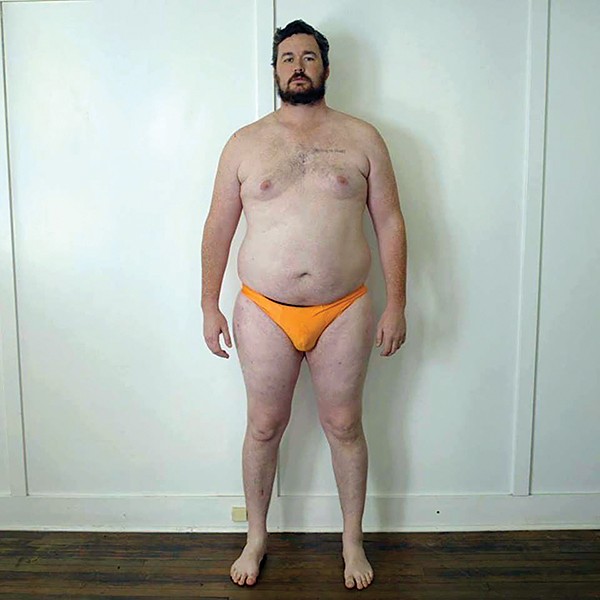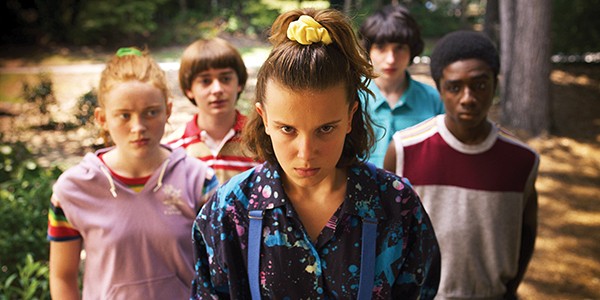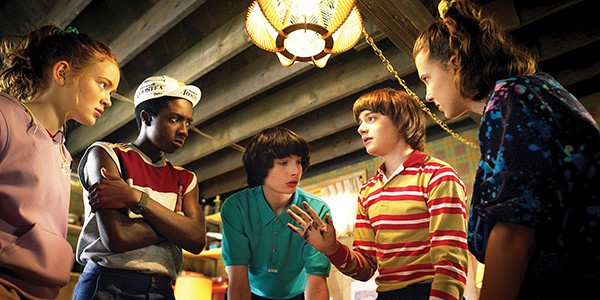In 1991, John Grisham published his second novel, The Firm. The lawyer-turned-author’s tautly written legal thriller about a naive young man’s experience with a corrupt Memphis law firm became an instant bestseller. Two years later, Sydney Pollack directed the film adaptation starring Tom Cruise. The film grossed $270 million ($483 million in 2019 money) and indelibly associated Memphis with the legal thriller genre.
More importantly, from the city’s point of view, the success of The Firm also attracted a number of other big-budget film productions to the Bluff City, such as The Rainmaker, The People vs. Larry Flynt, 21 Grams, and, by the middle of the ’00s, Academy Award-winners like Walk the Line and Craig Brewer’s homegrown Hustle & Flow.
But then, shortly before the financial crisis of 2008, the stream of Hollywood productions coming to Memphis dried up. Inspired by the success of Toronto, Canada, in attracting productions like The X-Files, states such as Louisiana and Georgia began offering incentives in the form of tax credits and other perks to entice Hollywood to locate productions there.
 Jake Giles Netter/NBC
Jake Giles Netter/NBC
Going straight — Caitlin McGee (left) and Jimmy Smits play father-daughter attorney duo at the Strait Law Firm.
It worked. New Orleans and Shreveport became unlikely film hubs, and billions of dollars of film and television money — including big-budget films from Marvel Studios — flowed into Atlanta.
In 2011, Brewer fought hard to get Paramount Studios to allow him to film the remake of Footloose in Shelby County, but to no avail. The production landed in Georgia, and as a result, many of Memphis’ tight-knit group of film workers left for greener pastures. Local micro-budget indie filmmakers soldiered on, as we always do, but besides that, the 2010s were bleak years for film production in Memphis.
The 2017 CMT series Sun Records, which focused on the birth of rock-and-roll, was the first sign things might be thawing. Last year, the Hallmark Channel came calling with Christmas at Graceland and Wedding at Graceland. As 2019 dawned, something new was in the air. And it was big.
A Routine Request
On January 10th, Memphis and Shelby County Film and Television Commissioner Linn Sitler got a call from NBC Universal. It was a request for photographs of several Memphis locations, the kind of thing her office fields all the time. A little over a week later, she got a call from Bob Raines, executive director of the Tennessee Entertainment Commission, informing her the state was in negotiations with NBC over a show called Bluff City Law. “I thought, ‘You’re kidding me! They haven’t even come here to scout. They just asked for one package of pictures,'” Sitler recalls.
Raines was not kidding. His contacts at NBC Universal were testing the waters in Tennessee.”I had developed an initial relationship with them over a production called Real Country that was done here in the state.”
NBC executives were very enthused about their new concept, and Raines knew he had to move quickly to make sure it didn’t morph into “Atlanta Law.” When producers pitch a new show to a network and the network is interested, they will order a pilot — a proof-of-concept episode that introduces the characters and situations the proposed series would deal with. Most shows never get past this point. But if Raines and Sitler couldn’t convince NBC to film the pilot in Memphis, there was no chance the eventual series would be filmed here. “The state moved very quickly — with record speed — and agreed to incentivize the pilot,” says Sitler. “On February 4th, the Memphis production office opened.”
A Powerful Message
Bluff City Law was conceived by Dean Georgaris and Michael Aguilar, both veteran writer-producers of film and television. David Janollari, who has earned five Emmy nominations and a Golden Globe Award for his work on Six Feet Under, American Family, and, in 2005, a mini-series about Elvis Presley, is the executive producer of the new series. “The inspiration for [Bluff City Law] is kind of two-fold,” says Janollari. “We were looking to do a great law franchise show that kind of harkens back to some of the great classic legal movies: The Verdict, A Few Good Men, Erin Brockovich. The list goes on. How do we capture that, stand up and cheer the heroes who will triumph over injustice on a week-to-week basis? Also on our minds were inspirations like L.A. Law and The West Wing that dealt with issues and with real, contemporary life in a very honest and provocative and hopefully thoughtful way.”
The courtroom is where many of the conflicts and issues of American society come to a head, making legal thrillers perpetually popular. But legal maneuvering can be dry, so the team knew that this show about “a David versus Goliath kind of law firm that takes on big injustices and fights the noble fight” needed a familial core.
The lead character is named Elijah Strait, whom the executive producer describes as “this kind of Atticus Finch character, a renowned, successful, and popular lawyer in Memphis. We wanted to know what his family life was all about.”
Elijah, the writers decided, has a daughter named Sydney who had followed in his footsteps and entered the legal profession. But when she went to work for the family firm, she and Elijah clashed, and so she left for a bigger, more corporate firm. In the pilot episode, the sudden death of Sydney’s mother motivates her to return to the Strait Law Firm.
“We wanted to put a contemporary American family dynamic on the air in a different way than we’ve seen in a while,” Janollari says. “This father and daughter are cut from the same cloth, and in that respect it’s both a good and a bad partnership because they are so similar and know each other’s tricks and foibles and flaws.”
No matter how good the concept, casting can make or break a show. For the crucial character of Sydney, with whom the audience would be asked to identify, the producers held extensive auditions before finding Caitlin McGee.
“Caitlin walked in and just mesmerized us,” Janollari says. “She kind of transformed into the character right in front of our eyes. It was a magical moment. … This is really her first big series leading role, and she’s fantastic. She’s a breakout. People are going to discover her and fall in love with her. She’s both powerful and incredibly vulnerable at the same time.”
The team knew who they wanted for Elijah. Jimmy Smits first attracted attention as one of the breakout stars of the NBC series L.A. Law. He’s got more than 20 big screen credits, including appearances in two Star Wars movies as Princess Leia’s adoptive father, Bail Organa. His TV career includes stints on NYPD Blue, Dexter, Sons of Anarchy, and, most importantly, three years on The West Wing.
“The West Wing was a kind of touchstone for us as we were developing the show, in terms of it really feeling like it was of the moment and addressing issues that were on people’s minds on a day-to-day basis,” Janollari says. “We live in a world which is even more complicated and more messy, from a standpoint of ‘What is truth?’ and ‘What is right?’ If we can pound the drum a little without being preachy, with the message that you can fight the good fight and you can change the world by sticking to your guns and standing up for the truth, we think that’s a powerful message to land in the world at the moment.”
The Clocks Are Ticking
As the Bluff City Law production offices ramped up in Memphis, Sitler and Raines faced a series of obstacles and a looming deadline. States such as Georgia, which have income taxes, offer productions transferrable tax credits that they can auction off to local companies for a profit. Tennessee doesn’t have a state income tax. “Our system is not a tax-credit system. It’s a grant system,” says Raines.
On paper, the Tennessee incentive structure promises a 30-percent refund of salaries paid to Tennesseans and a 25-percent refund of other spending, such as construction, catering, and transportation. Given the budget NBC was proposing, that translated to a $15- to $20-million incentive grant. It’s a hard sell to budget-conscious legislators, but Raines says these incentives can pay off in a big way.
“The state of Tennessee has invested about $69 million in reimbursements over a 10-year period,” he says. “We’ve gotten back $78 million in sales tax revenues. The program has generated $480 million in income to Tennesseans working in the production industry that we would not have seen without the incentives. It produced $655 million in economic output. … So when people ask, ‘Why are we giving money to productions?’ We’re impacting small businesses. We’re creating high-quality jobs.”
Sitler cites a recent incident when she was able to access a Shelby County jobs training grant to help a young woman train and join the union for the wardrobe department of a Memphis-based production. The woman has worked steadily since and landed a job on the Bluff City Law pilot. “It can lift people literally out of poverty once they learn the job skills,” she says.
In early 2019, Raines and Sitler were trying to explain all this to a brand-new governor and a legislature that had just experienced a 30-percent turnover. Between the legislative session schedule and the deadline for NBC to order the pilot to series, multiple clocks were ticking. “We’re trying to educate them on what the entertainment incentive system is and what we did for the state, utilizing all the data that we have,” says Raines. “They’re just trying to get up to speed on the basic practicality of the system — not only just on film and television, but the entire system.”
By late February, Sitler was shuttling back and forth between meetings in Memphis and Nashville. She found an early ally in the Black Caucus, led by Representative G.A. Hardaway and State Senator Raumesh Akbari, who voted to make an $18-million incentive grant appropriation their top priority. “I give credit for this to my board chairman Gail Carson, who knows all of the members of the Black Caucus and they all trust her greatly,” Sitler says.
But a setback loomed. “The new budget came out March 4th, and there was nothing — zero new funds for the state film incentive fund. Nothing at all,” she says.
On March 11th, filming started on the Bluff City Law pilot.
Hanging in the Balance
“We had a really wonderful experience shooting this pilot in Memphis,” says Janollari. “Our cast is terrific, the script by Dean Georgaris is just terrific and smart and funny and kind of epically emotional. Working in Memphis was a truly charmed experience. The city opened up its doors to us, treated us great, and embraced us.”
But even as they filmed, the precariousness of the situation was not lost on the locals hired for the production. “A couple of the crew people from Bluff City Law started a letter-writing campaign, and I think that really, really helped,” says Sitler. “What I was told was that it made the administration and some of the legislators suddenly take notice that this was something that Memphis really wanted. … It was gratifying to hear reports from the state that the meetings would start with, ‘How many letters did you get today? How many emails did you get today?'”
But even as shooting ground on, it became clear that the initial $18-million request was not going to be fulfilled and that any incentive money would come from either supplemental Memphis and Shelby County budget requests or county and city sources. On April 15th, two-and-a-half weeks after filming wrapped, Governor Bill Lee announced that the supplemental budget would include $4 million in new money for the state film fund.
The Big Deal
Meanwhile, in Los Angeles, NBC was mulling over the results of the pilot shoot. Georgaris’ script deftly juggles the relationship between Elijah and Sydney as the father and daughter try to reconcile while taking on an agribusiness giant whose product causes cancer. Memphis locations include the courthouse, where McGee screams an authentic scream in the bathroom, and the Four Way Grill in Soulsville, where a tense lunch meeting takes place between opposing counsels. NBC execs were so impressed with the pilot that they ordered Bluff City Law to series on May 6th. The question was, would they film here, or, like the short-lived series Memphis Beat, do the bulk of their filming elsewhere, venturing to the Bluff City only for the occasional exterior shot?
The scramble continued. The state finally agreed to kick in $2.5 million, and Mayor Jim Strickland’s office searched the coffers for more funding. “A network TV show is a big deal, and we all understood that from from the get-go,” says Reid Dulberger, president and CEO of the Economic Development Growth Engine (EDGE). “This was a team effort, and to my mind, the team included NBC. In all my discussions with them, they clearly wanted to film the series here. We have not always seen that in the past. … Generally speaking, the economics of the film and TV industry tend to be very responsive to local subsidy and local financial support. But even when it became abundantly clear that there wasn’t going to be a huge amount of money available at state level or local level for this production, the NBC people continued to work with us.”
In the end, EDGE contributed $1.4 million in county and city incentives. An additional $350,000 came from the marketing budget of Memphis Tourism. “It was a tremendous opportunity for us, one we couldn’t pass up,” says Memphis Tourism president and CEO Kevin Kane. “We’ve had cable shows, but I don’t think we’ve ever had a show on NBC, CBS, or ABC during primetime. After The Voice on Monday night, 9 p.m. Central, is about as good as it gets for viewership potential.”
The experience of 124 episodes of the show Nashville, which ran on ABC and CMT from 2012 to 2018, supports Kane’s decision. “That’s what made the tourism boom here so quickly,” says Raines, who lives in Nashville. “The numbers we saw were 18 percent of the people who saw the show in Middle America, they were getting up off their couch and coming to the city to experience it.”
After an initial ask of $18 million, NBC finally said yes to a $4.25-million package. “I think in the end, they really wanted that authenticity, and then they saw how hard we worked together to try and bring some resources to the table,” says Raines.
Production of the first season begins on July 20th and will last for about six months. David Janollari says he is eager to return to Memphis. “We’re going to strive in the series to include Memphis in each episode, even more than we did in the pilot — really feature the beauty and the history of Memphis and get out on the street more, into real authentic locations.”
The pilot is scheduled to air on NBC on September 23rd. “We’re looking forward to embracing Memphis and reflecting it accurately and beautifully on screen, capturing everything but the aroma of the barbecue,” says Janollari. “But we will be featuring a lot of barbecue.”




 Mike McCarthy
Mike McCarthy  Haley Mitchell
Haley Mitchell  Southern Poverty Law Center
Southern Poverty Law Center 



 Calvin L. Leake | Dreamstime.com
Calvin L. Leake | Dreamstime.com  Jake Giles Netter/NBC
Jake Giles Netter/NBC 